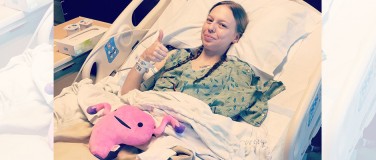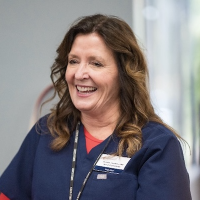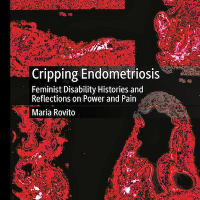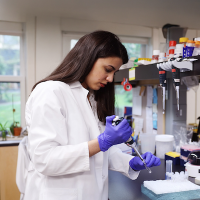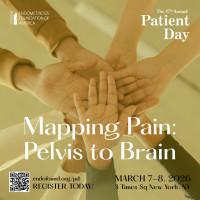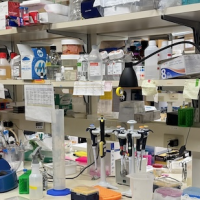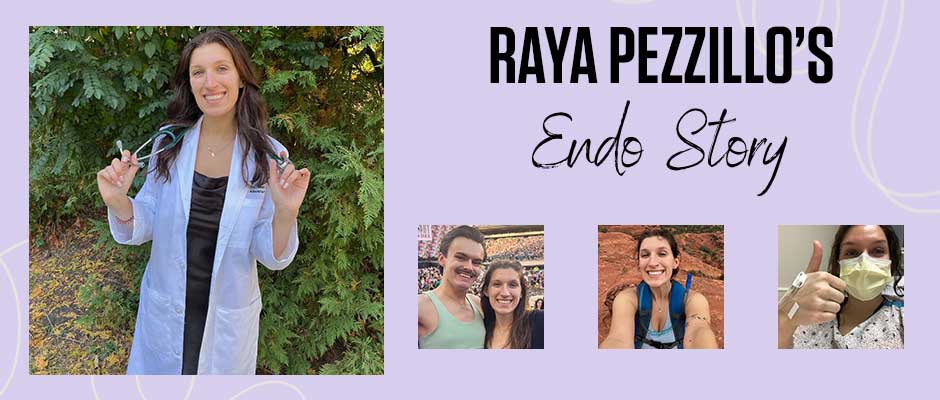
When Raya Pezzillo was in college and told by a doctor that she likely had endometriosis, she put off surgery, hoping she could graduate first. But she also had another reason for delaying it.
“I was trying to convince myself that there was something wrong with me,” Pezzillo said. “After being dismissed by so many doctors for so long, it got into my head that maybe none of the symptoms I felt were real. I thought about how silly it would be if I had surgery only to find that I’d been making it all up. It took me a long time to accept and trust that something was really wrong.”
All of Pezzillo’s symptoms were real. The Pennsylvania native, who now works as a critical care physician assistant in Delaware, said the symptoms started in high school about a decade ago.
“The biggest thing was heavy and painful periods with a lot of cramping,” she said. “It also got to the point where I would get very dizzy and nauseous and almost black out when I’d have my period. I missed a lot of classes because of the nausea.”
Pezzillo said she was given the runaround by just about everyone she went to for help.
“It was similar to the story everyone with endometriosis has: my claims were dismissed,” she said. “I was told, ‘That’s normal,’ and ‘That’s how periods are supposed to be.’ I heard that all the time from my OBGYN and other girls who were going through their periods.”
When Pezzillo was 17, her mom’s friend referred her to a Facebook group of endometriosis patients. Pezzillo first learned about the disease there and later suggested to her gynecologist that she might have it.
“She just brushed it off,” Pezzillo said. She said that maybe I had it, but I’d have to have surgery to diagnose it, and blah, blah, blah. She gave me birth control to suppress my cycles. It worked for some time, but my pain was also happening outside of my period, so it didn’t really help.”
In early 2019, when Pezzillo was 19 and in college, her pelvic pain and nausea worsened. She also experienced significant fatigue. The symptoms caused her to miss numerous classes and limited her social life. Desperate for answers, she consulted another gynecologist within the same practice for a second opinion. The response was absurd.
“She said, ‘It sounds like you have an STD,’” Pezzillo recalled. “I told her I knew I didn’t have an STD, and she said, ‘Well, but you have pelvic pain and nausea…’”
Tired of dealing with this practice, Pezzillo learned through the Facebook group that excision surgery was considered the gold standard for treating endometriosis, so she searched for and found an excision surgeon near her home in Pittsburgh.
“Within literally three minutes of me telling him my symptoms, he said, ‘Oh, yeah, it sounds like you probably do have endometriosis,’” Pezzillo said. “It seemed like he cared a lot about what I was saying, and it was crazy how validated he made me feel right away. He told me what treatment options I had going forward, saying that surgery was the best option and the way for him to definitely diagnose it. But he also said if I didn’t want to have surgery right away, there were things I could do to try to control it until I got out of college.”
Also worth noting about that visit is that the doctor ordered an MRI but didn’t let the results overrule Pezzillo’s symptoms. Though surgery is the only way to officially diagnose endometriosis, the doctor hoped the MRI would help validate his suspicion of the presence of the disease. The results showed that everything appeared to be normal.
“But he said, ‘It really doesn’t mean anything because you’re having pain, and that’s what matters,’” Pezzillo said.
Pezzillo began her senior year in the fall of 2019. Despite continually battling symptoms since high school, she was on track to earn her degree in May 2020, achieving it in just three years. Still trying to accept that the MRI and everything she was told by every doctor (before her most recent one) was wrong, Pezzillo spent the 2019-20 school year determined to get through it without surgery. She relied a lot on heating pads and Advil, did pelvic floor therapy for about six months, and met virtually with a gastrointestinal doctor to see if he could offer advice.
“All I did was explain to the GI doctor that I probably had endometriosis,” Pezzillo said. “I told him that I had a lot of nausea and pelvic pain and was seeing a doctor for it, but I wanted to see if he could help me until I decided to have surgery. He said, ‘Have you tried cognitive behavioral therapy?’ Needless to say, I didn’t go back to him.”
Three months after graduation, Pezzillo started a job as a patient care technician in an ICU unit at a Pittsburgh hospital. She continued to try to put off surgery, but after a few months, she was convinced it was time.
“The pain was interfering with my work,” she said. “I couldn’t do my job appropriately and had a very low quality of life.”
She had surgery in January 2021.
“When I woke up, the first thing I said was, ‘Did you find anything?’” Pezzillo recalled. The doctor had removed endometriosis from her bowel, bladder, and ureters, among other places.
“I was so relieved,” Pezzillo continued. “I can’t even explain the feeling at that moment. I wasn’t crazy, there was a reason for my pain, and everything was real. It all finally made sense.”
The last five years have been good for Pezzillo—she hasn’t missed any work due to endometriosis—but she recently began experiencing some pain again. She believes being on her feet all day in an intense job may be exacerbating it.
“I’m thinking of maybe having another surgery later this year,” she said. “It’s going to depend again on my quality of life.”
Despite all that Pezzillo has been through, she said she’s actually grateful for the overall experience.
“I think that’s something a lot of people with endo say. It’s definitely encouraged me to advocate for myself and advocate for endometriosis,” she said. “There are so many people, especially those in healthcare, who are so misinformed about what it is and how to treat it. And now, having gone through something with a lot of chronic pain and not being listened to, I can advocate for my patients.
“I always like to share my endometriosis story,” she continued. “I’ve pushed it on Instagram and in other places. I’ve even had people I went to high school with who have gone on to find doctors who have diagnosed them with endometriosis. For that reason alone, I’m grateful to be in the position I’m in. Hopefully, my story can encourage others to get checked out and diagnosed sooner than the typical 10 years many people have to wait.”
*Patient stories submitted to EndoFound.org are the patient's views, not necessarily those of the foundation. All testimonials are from real patients, may not reflect the typical patient’s experience, and are not intended to represent or guarantee that anyone will achieve the same or similar results.




